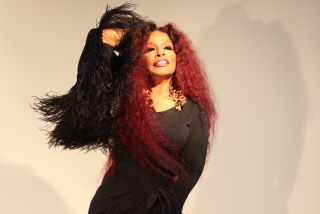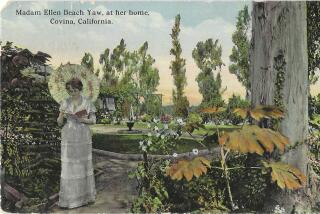Obituaries : Sylvia Syms; Jazz and Pop Cabaret Singer
- Share via
Sylvia Syms, the ebullient vocalist, died in New York City early Sunday during one of the series of performances she had dedicated to Frank Sinatra, who called her “the world’s greatest saloon singer.”
Miss Syms was singing an encore after a performance at the midtown Manhattan Algonquin Hotel’s Oak Room when she fell to the floor about 1 a.m.
Her publicist, Keith Sherman, said she was rushed to nearby St. Clare Hospital where she was dead on arrival of undetermined causes. The self-taught jazz and pop singer, who had been performing in clubs since the 1940s, was 73.
Her monthlong engagement at the Oak Room was titled “Sylvia Syms Sings Sinatra,” a tribute to her close friend whom she met nearly 50 years ago at a Billie Holiday concert.
Born in New York and raised in Flatbush, Miss Syms was discovered by two show business legends, bandleader Benny Carter and actress Mae West, who saw her singing in a Greenwich Village night spot.
She had been a victim of polio as a girl and described herself as “a very removed child.”
Singing came naturally to her, she was quoted as saying in the anthology “American Singers.” Her career started, she recalled, “when I sang with a full and beautiful voice before I’d learned to talk. I sang in my carriage, and later I’d sit on the front stoop and sing at the top of my lungs.”
“But my parents didn’t know how to cope with my singing. They were poor and their backgrounds had taught them that the life of a singer or actress led directly to the gutter,” she added.
Miss West put her in a revival of “Diamond Lil” as Flo the Shoplifter. Receiving rave reviews, Miss Syms began performing regularly in the theater and in clubs including Ruban Bleu, the Village Vanguard, the Living Room, the Half Note, Cafe Carlyle and Michael’s Pub.
She often played the part of Bloody Mary in productions of “South Pacific” and had the lead in a company of “Hello, Dolly!” Her other plays included “Dream Girl,” “Thirteen Daughters,” “Funny Girl,” “Flower Drum Song” and “Camino Real.”
Her dozens of recordings included the 1956 million-seller “I Could Have Danced All Night” from “My Fair Lady.” Sinatra produced her best-selling album, “Syms By Sinatra,” and conducted the orchestra himself.
She also taught for the last several years at Northwood Institute, a performing arts school in Dallas where she had been given an honorary doctorate and where she conducted master classes.
Most recently, Sherman said, she had been recording an album to be released next month and rehearsing the Algonquin performances that had been scheduled to run through May.
Sherman told the Associated Press that he had spoken to Miss Syms several times Saturday and said there was no signal anything was wrong until she went over to greet composer Cy Coleman and “just put her hand on his table and collapsed.”
Though lacking an overpowering voice, the emotional strength she brought to her songs placed her among the classic cabaret performers of her time.
And it was cabarets that she preferred to other appearances.
She told Newsday in 1990 that she was never “good-looking enough” to be a band singer. “I was a little, short, fat, not particularly attractive girl who grew up to become a short, fat, not particularly attractive woman who learned the craft so much that it became part and parcel of who I am. This is what I learned from Billie Holiday. How to establish a one-to-one relationship with the audience based on a you-and-me contact.”
More to Read
The biggest entertainment stories
Get our big stories about Hollywood, film, television, music, arts, culture and more right in your inbox as soon as they publish.
You may occasionally receive promotional content from the Los Angeles Times.










